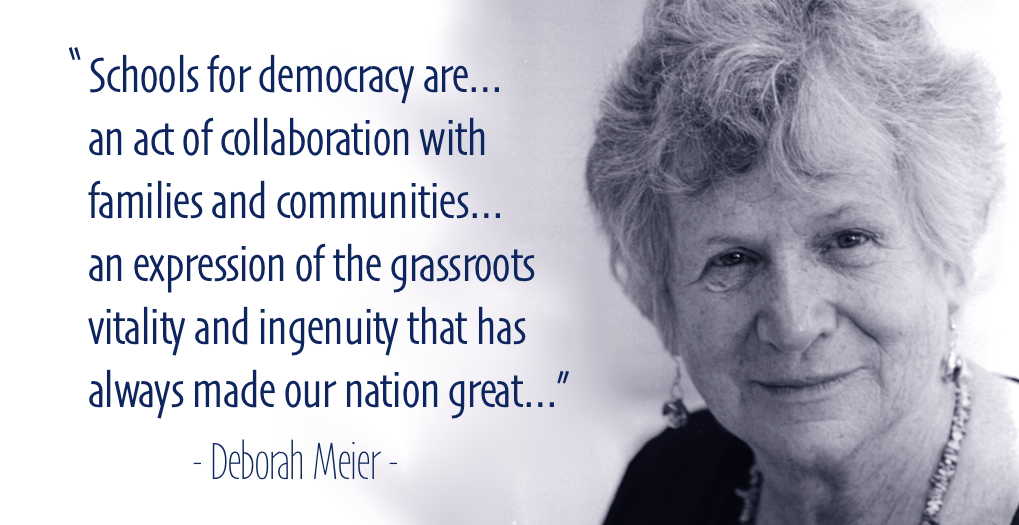How Habits Support Democratic Schooling

Deborah Meier continues her conversation with Harry Boyte. To read their full exchange, please visit here.
Dear Harry and friends,
Thinking about "habits of mind"—as you take it up in your final paragraph—is a good reminder that schools serve purposes beyond those of the school itself. Public schools serve ends that being raised just at home, church, or other personally chosen private institutions may not serve. If we tax "the people" to educate other people's children as well as their own, the process must serve the common good, to pass on those underlying understandings that hold us together. It gets complicated!
When we started Central Park East Secondary School in 1995, we faced a huge task. CPESS was to be a public East Harlem school with an incredible amount of promised independence—including devising our own definition of what a graduate should be able to demonstrate publicly in order to receive our state-endorsed diploma.
It was a weighty responsibility, blessed by a surprising number of powerful people, including the New York state superintendent of schools, Tom Sobol. The opening staff, about eight of us, met together to tackle these issues in 1995 and every year after to tinker and revise as we went along. But we held on to a few essentials decided on that very first year.
The "Five Habits of Mind" (and heart) were never codified into one particular wording. Over the years we, the kids, and our admirers tinkered with them, expressing them in many different ways that seemed to add rather than take away from our original thinking. I liked that fact.
The first was kind of old-fashioned: "How do we know what we know? Or: What's the evidence?"
The second—although the order in which we developed them wasn't intended to claim any special rank—was something like: "Could it have been different? How else, supposing that?"
The third was: "Is there another viewpoint—in fact, viewpoints? Who and why?"
The fourth was: "Is there a pattern? How are things related to each other? What are the connections?"
And finally, fifth: "Who cares? Why does it matter and to whom?"
We sometimes summarized the five as "habits of the heart": "open," "skeptical," and "empathetic."
We agreed that all the "stuff" we tackled in our curriculum would be subject to these five habits of mind, defining the themes we developed for the six years or more students typically spent at our school (grades 7-12).
We added some "habits of work"—like being reliable ("I can count on you"), collaborative, and committed to each other.
The focus was on "habits"—mind or heart—not just "knowing how." E.g., I know how to put my keys in the designated place every evening when I come home, but I'm not in the habit of doing so.
It's precisely in times of stress and crisis that we most need to have good habits. Democracy is a messy idea, and in practice it's messier still. It's precisely in states of crisis that we count on such habits. We wanted the number to be small and open to many ways of saying and seeing them. We wanted them to fit our different academic disciplines, but we wanted them to apply beyond the classroom—to the playground, our neighborhoods, and our society at large.
The math teachers, the science teachers, the English teachers, and the history teachers all felt very comfortable with the five. "Does it matter?," for example, can apply narrowly to our particular academic discipline, as well as to ordinary and extraordinary civic and personal endeavors. We avoided "cause-and-effect" language on purpose for the broader term of "connections and patterns."
We rejected the term "academic" as having a very questionable popular meaning—irrelevant, dull—quite the opposite of our intent. We liked the term "intellectual"—as a term that could and should be applied to the work of all citizens.
These five served us well and, 12 years later, were the basis for Mission Hill, a K-8 school in Boston. But, good as they are, I'd not favor mandating them. We may not have to always reinvent the wheel, but "buying in" is not sufficient either. It turns out that democracy itself must be reinvented over and over as contexts change and words come to take on different meanings and importance.
Does this make any sense for graduate study, Harry? Or citizen education? What's missing?
Deb
How Habits Support Democratic Schooling - Bridging Differences - Education Week:
